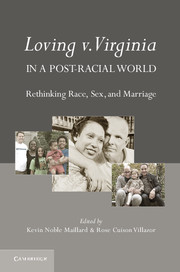Book contents
- Frontmatter
- Contents
- About the Contributors
- Acknowledgments
- Foreword
- Introduction Loving v. Virginia in a Post-Racial World
- Part One Explaining Loving v. Virginia
- Part Two Historical Antecedents to Loving
- Part Three Loving and Interracial Relationships: Contemporary Challenges
- Part Four Considering the Limits of Loving
- 11 Black Pluralism in Post-Loving America
- 12 Political Blackness
- 13 Finding a Loving Home
- Part Five Loving Outside the U.S. Borders
- Part Six Loving and Beyond: Marriage, Intimacy, and Diverse Relationships
- Permission Granted
- Index
- References
12 - Political Blackness
A Sociopolitical Construction
Published online by Cambridge University Press: 05 July 2012
- Frontmatter
- Contents
- About the Contributors
- Acknowledgments
- Foreword
- Introduction Loving v. Virginia in a Post-Racial World
- Part One Explaining Loving v. Virginia
- Part Two Historical Antecedents to Loving
- Part Three Loving and Interracial Relationships: Contemporary Challenges
- Part Four Considering the Limits of Loving
- 11 Black Pluralism in Post-Loving America
- 12 Political Blackness
- 13 Finding a Loving Home
- Part Five Loving Outside the U.S. Borders
- Part Six Loving and Beyond: Marriage, Intimacy, and Diverse Relationships
- Permission Granted
- Index
- References
Summary
During the presidential campaign of Barack Obama, and his subsequent election to office, the public and the media consistently questioned whether or not he was black. This inevitably reopened the discussion of what, exactly, is blackness? The son of a white mother from the state of Kansas and a black, Kenyan father, President Obama, pursuant to the current U.S. Census definitions, is black and identifies himself as such. Yet people continue to interrogate Obama’s blackness. Is he black enough because he was the former editor of the Harvard Law Review? Was he too black because he attended Reverend Jeremiah Wright’s church? Is he black because his mother is white and his father black? Should he be called multiracial instead? A 2009 survey by the Pew Research Center found that the answer to this question varies by race and ethnicity. Because individuals such as President Obama are no longer constrained by Jim Crow laws in this post–Loving v. Virginia era, many choose to identify in ways that challenge the current census definition of blackness. This inevitably raises the question of whether or not our racial categorizations should reflect the modern realities of race. The answer to this question has important implications for a number of social, political, and legal matters.
To illustrate the complexity of this inquiry, let us examine the hypothetical situation of cousins Jason, Julia, and Sheila. They, like the majority of their generation born in the post–civil rights movement era, did not grow up with clearly delineated racial lines, and although they are subject to the forces of racism and oppression, they are often unaware of how it impacts their daily lives.
- Type
- Chapter
- Information
- Loving v. Virginia in a Post-Racial WorldRethinking Race, Sex, and Marriage, pp. 169 - 180Publisher: Cambridge University PressPrint publication year: 2012
References
- 1
- Cited by

